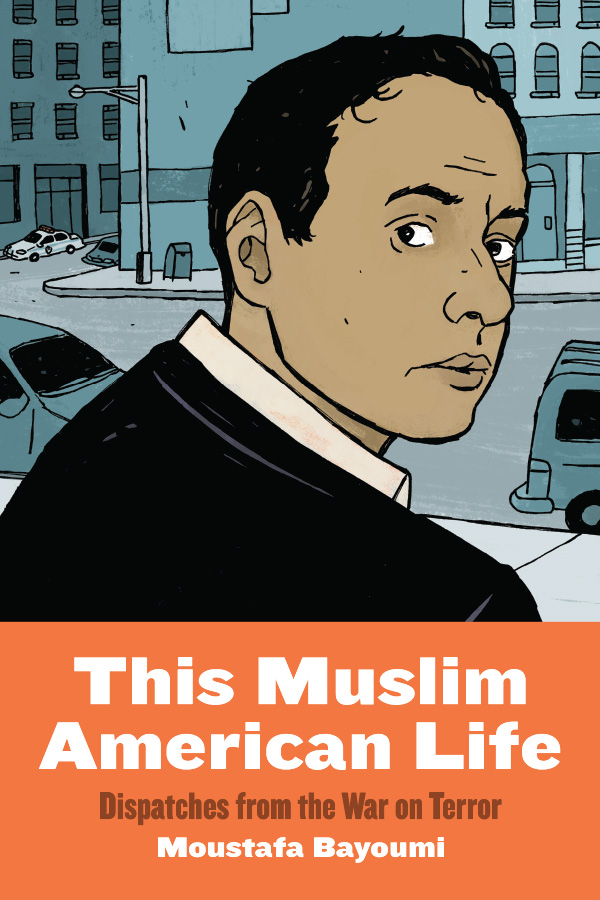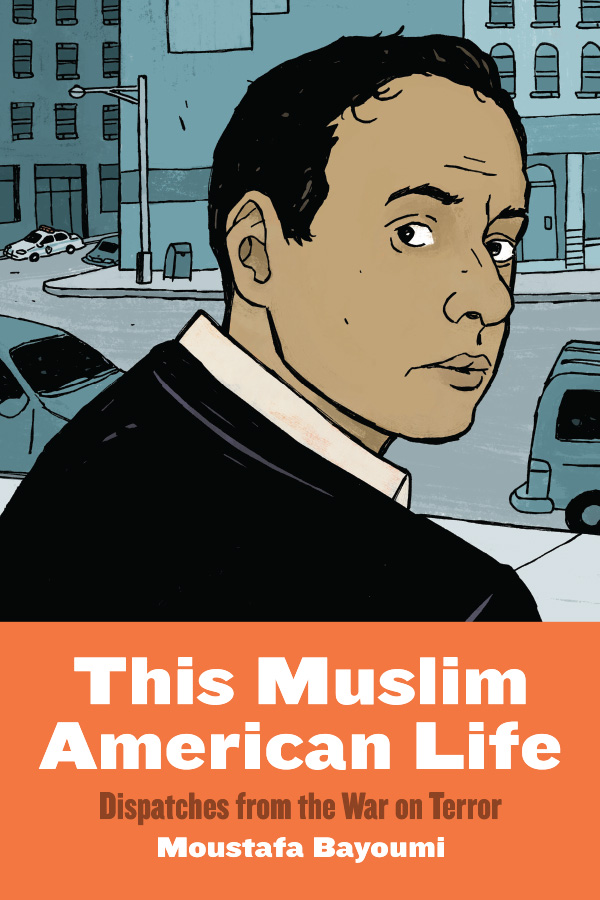by Neda Simaika and Raihan Faroqui | (informed Comment) | – –
The award-winning author and professor of English at Brooklyn College (CUNY), Moustafa Bayoumi, discusses the fight to protect American values for all people (including Muslim Americans), a healthy dose of imagination, and the Netflix original series, Master of None.
Q. In your recent book, This Muslim American Life, you write, “I became a citizen because I believe the fight for preserving the rights of the people of the United States, not only other citizens, is worthwhile. And I can do that more effectively as a citizen of the country where I live. In that fight, lies the defense of American values of tolerance and respect.” How’s that fight going?

It’s forever an incomplete project. I’m certainly not the only one who’s involved in this fight, and the battles are there every single day, especially during presidential election years. I think we always have to be clear-eyed about that and know the kind of confrontations that are in front of us.
But at the same time, I feel confident because the battles that many people within Muslim-American communities in this country are waging are oriented precisely around the values that I, and many others, cherish deeply–values such as equality and justice for all. Those are the things that we’re fighting for and we’ll have to keep fighting for.
Q. It’s an unlikely pastime for a tenured English professor. Though it does seem the civil rights struggle of Muslim-Americans (and many minorities, for that matter) is the stuff of novels, and your essays do appeal to a human sensibility, rather than a political one. Why should non-Muslims read your books?
One thing that fundamentally interests me is the way that people, and communities, have become political pariahs in this country. In tracing how that happens, we can often uncover how power itself operates in our society. Who has the power to declare a community suspicious? What resources are expended to patrol that suspicion? If it’s the Muslim-American community or the Arab-American community today, who knows who it will be tomorrow?
That’s one of the reasons why, since 9/11, the Japanese-American community on the West coast has been very active in advocating for Arab-American and Muslim-American rights and issues, because they see some parallels between what happened to them and what’s happening to Muslim-American communities in this country. And in that recognition lies something very profound, namely that these fights are not really about our identities but about our collective politics. These are struggles over what kind of society we want to live in. We should all care about the health of our collective society.
Q. What are your thoughts on coalition building? Is yours a call for groups to come together?
Yes, completely! We are living in a time where there’s a lot of opportunity for thinking about the relationship between domestic marginalization and international marginalization. This is extremely important. What we need to cultivate is an imagination that exceeds both the boundaries of the nation-state and the limitations of party politics. We need to be able to imagine new kinds of politics.
In recent years, we have seen many iterations of a kind of grassroots organizing that really seeks to connect local and global politics. Whether that’s happening in Ferguson, Missouri or on the West Bank, it’s all extremely interesting and important. And I think these movements also indicate the possibilities of another kind of society slowly emerging, another kind of collective that could not only challenge the status-quo but could rethink what a more just, more equitable planet would actually look like.
Q. Your message can seem uplifting at times. At one point in This Muslim American Life, you express hopes that How Does It Feel to Be a Problem one day becomes “a book about history.” What will it take to get there?
Despite how it may sound, I’m not a believer in the uplifting message. Nor am I really quite an optimist either. It’s more that I don’t want to be defeated by the pessimism of this age. I don’t think pessimism is an option, so I refuse it. Of course, there are countless ways to be beaten down by the political system today, which is as overwhelming as it is powerful.
But there will always be alternatives, and our work is to come up with those alternatives in rich and creative ways. If those alternatives end up sounding optimistic, so be it. The tone is probably a result of me trying to water the imaginations of people who are reading my work, to let them know that other ways of living and thinking and being and cooperating are possible.
Q. Meanwhile, the ascent of Trump and his kind has been unbelievable. Isn’t the phenomenon also forcing Muslim Americans to become more politically active to survive, giving youth a chance to reclaim the narrative?
And you accuse me of being an optimist! But I think you are right. We should not be afraid of Trump and what he represents. If we do, we’ll just play right into his (small) hands. Let’s look at what faces us squarely, let’s mobilize, and let’s fight right back. We have to do that for the good of the nation, for the good of where we live.
There are forces in this country that really want to push a clash-of-civilizations narrative. I reject the idea of the clash of civilizations categorically. It’s bogus and doesn’t exist. But the problem is that if you push the clash-of-civilizations thesis hard, it can become a self-fulfilling prophecy. We have a responsibility not to let that happen. So I think there is an opportunity here to reject the rhetoric that’s emanating from the likes of Donald Trump and instead to come together and discover who else is with us. I suspect what we will find is a huge, friendly, and diverse group of people.
Q. Humor and satire are refreshing in such an otherwise difficult conversation concerning issues you’d sometimes rather avoid. Your writing humorously frames certain issues in a way that you want to read, and read more. And you also praise Jon Stewart and Stephen Colbert for their contributions. What do you see as the role of humor and satire in this conversation?
Humor is crucial. With humor, the criticism can often be more scathing, more honest. One doesn’t have to soften the blow. We suffer from some of the most debilitating representations around today, and so I use humor to offer a big F-you to this representational logic whenever I can. I feel it’s more effective to get people laughing about the absurdity of representation than it is to lecture at them like a boring professor. (Being a boring professor is my day job. I don’t need to subject my readers to that.) With humor too, it’s often easier for readers to see the world from the perspective of the marginalized. You can always tell people what life is like for you, but it’s better to show them. And satire can make that experience even more pointed.
Q. So maybe there just need to be more Muslim-American comedians. Even Aziz Ansari, with his new show Master of None on Netflix and his stand-up comedy, has not only given first-generation Indian-Americans limelight, but immigrant life in general.
Absolutely! I think there definitely need to be a lot more Muslim Americans involved in the culture industry in general. Not just in front of the camera, but also behind the camera. Not just acting but also writing. And producing, being involved on many different levels. You know, there was a recent study about publishing that found that the publishing industry is still 89% white. The country’s not 89% white.
We can’t just complain that we’re being misrepresented. We have to take charge of those representations at the same time. I think the Aziz Ansari’s show is very interesting on several levels. It’s excellent to see him represent brown-ness, immigrant-kid-ness, and Indian-ness with more complexity that we are used to in popular culture. But it’s also interesting that there’s no discussion of religion at all in the show. It’s as if he’s running away from his Muslim-ness…
Q. He admits that he’s not an observant person. Maybe if he were more observant or outwardly claimed religion, the show may not have been as successful.
That certainly could be. But what’s interesting to me is that the show won’t touch anything that has to do with Islam. I frankly don’t care how observant people are. What matters is how others see you, and “Muslim” has become recognizable as an identity today. In this way, it’s approximating Jewishness. It doesn’t matter how observant you are to Jewish-ness; you belong to that category because that category exists.
In fact, I think it’s even necessary that we have different representations of observance and religiosity within Muslim communities. For one thing, that’s simply accurate. There are many different ways to be Muslim and Muslims themselves have varied attachments to observance and piety. That’s how we live our lives. Most representations, though, tend to offer the very religious person on one hand and the very secular person on the other, often following a Good Muslim/Bad Muslim logic (or Bad Muslim/Good Muslim, in this case). But that’s simplistic and dangerous. Richer portrayals of Muslim life and Muslim-American life could go a long way in expanding our imaginations of how can we live together well, both in this country and on this planet.



 © 2025 All Rights Reserved
© 2025 All Rights Reserved